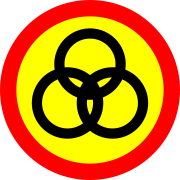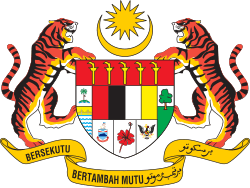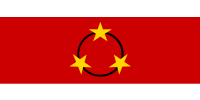Sarawak United Peoples' Party
The Sarawak United Peoples' Party, or SUPP (Chinese: 砂拉越人民联合党; Malay: Parti Rakyat Bersatu Sarawak; Iban: Gerempong Sa'ati Rayat Sarawak) is a multi-racial political party of Malaysia based in Sarawak. The SUPP president is Dr. Sim Kui Hian. He succeeded the post from his predecessor, Peter Chin Fah Kui in 2014. Established in 1959, SUPP is the first political party in Sarawak. It has its roots in left-leaning ideologies, nationalism and championing for the cause of the working class. Formerly it was one of the Sarawak component members of Barisan Nasional (BN) from 1970 until June 2018.[note 1] Together with other Sarawak-based BN component parties, SUPP always has had tension in its relationship with its Peninsula-based partners.[1] After the 2018 general election defeat of BN had proven that the model was no longer viable, and following a key meeting between all Sarawak-based BN coalition parties on 12 June 2018, SUPP has decided to leave BN to co-form a new Sarawak-based coalition of Gabungan Parti Sarawak (GPS).[2]
 | |
| Chinese name | 砂拉越人民联合党 Shālāyuè rénmín liánhé dǎng |
| Iban name | Gerempong Sa'ati Rayat Sarawak |
| Malay name | Parti Rakyat Bersatu Sarawak |
| Abbreviation | SUPP |
| President | Sim Kui Hian |
| Secretary-General | Sebastian Ting Chiew Yew |
| Deputy President | Richard Riot Jaem Chieng Buong Toon |
| Chairman of Central Youth Section | Michael Tiang |
| Chairman of Central Women's Section | Kho Teck Wan |
| Founded | 1959 |
| Headquarters | 7, Jalan Tan Sri Ong Kee Hui, 93300 Kuching, Sarawak |
| Newspaper | SA 'ATI (United) |
| Youth wing | SUPP Youth Section |
| Women's wing | SUPP Women's Section |
| National affiliation | Alliance (1970–73) Barisan Nasional (1973–2018) Gabungan Parti Sarawak (since 2018) Perikatan Nasional (since 2020) |
| Colours | Yellow, red, black |
| Dewan Negara: | 0 / 70 |
| Dewan Rakyat: | 1 / 222 |
| Sarawak State Legislative Assembly: | 7 / 82 |
| Website | |
| www | |
 |
|---|
| This article is part of a series on the politics and government of Malaysia |
|
|
|
History
Being the first local political party, Sarawak United Peoples' Party (SUPP's) origins are tied to Sarawak's history of 20th century political awakening. After World War II, the last Rajah of Sarawak, Charles Vyner Brooke ceded Sarawak to Britain in 1946, thus making it an official British Crown Colony – to the dismay of many locals. This eventually gave rise to local anti-cession and anti-imperialist movements which further sparked local political awareness. The triggering event was Sarawak's new Constitution of 1959 which fell short of expectations for many who hoped to see significant progress to self-governance. The need for an organised political front to champion Sarawakian interests finally led to the formation of SUPP on 4 June 1959, with Ong Kee Hui as its founding president.[3] With a "Sarawak for Sarawakians" ideology – SUPP's movement gained widespread support, including winning big in the local elections of November 1959, alarming the then ruling British colonial government. When the proposal for Federation of Malaysia was first mooted in 1961, SUPP came out strongly to oppose the idea. Ong argued for Sarawak's independence before setting up a greater federation.[3][4][5]
In December 1962, the British colonial government launched a crackdown on all dissenting groups in Sarawak. Many party members were detained, some even deported from Sarawak for alleged communist activities as, at the time, some members had links with Communist-affiliated organisations.[note 2] Nonetheless, SUPP still did well at the Sarawak elections of June 1963 but it left one-seat-short of a majority to form government, thus it remained as the opposition party. On 22 July 1963, Sarawak gained independent self-governance from Britain. On 16 September, Sarawak together with the Federation of Malaya, Singapore and North Borneo (Sabah) jointly founded the Federation of Malaysia. In June 1965, the government launched “Operation Hammer” to counter prevailing communist threats. Party leaders vehemently protested when about 10,000 Sarawakians men, women and children were forced to resettle under curfew – surrounded by barb-wire fencing – including more than a hundred SUPP members. Party leaders initiated daily visits to the resettlement centres to monitor the welfare of the detainees, but later, even this was barred by the government.
In May 1969, due to 13 May riots in Peninsular Malaysia, an Emergency Proclamation was declared across the country, suspending an ongoing elections in Sarawak. When the Sarawak elections resumed in 1970, SUPP emerged as the single party with largest number of votes, but no party has control of majority seats to form a government. Considering that this crisis for a functioning government occurred at a time when, on one hand, a state of turmoil post-13 May was still present, while on the other hand, people were rounded-up and detained without trial – SUPP accepted the invitation to form a coalition government to stabilise the situation. In exchange, the government agreed to SUPP demand that party secretary-general Stephen Yong be appointed to the State Operations Committee (the security directorate) so that the party can influence counter-insurgency operations to look after the welfare of SUPP detainees including Chinese settlers, in the resettlement centres.[6][7] In the ensuing years, SUPP generally had wide support at the polls even during the 2008 Malaysian general election where most of its allies suffered.[8]
However, it is no stranger to major setbacks at the polls: In the 1996 Sarawak election, its then president, the late Wong Soon Kai was defeated and thereafter decided to retire from politics.[9] A similar situation happened in 2011 Sarawak election when the then party president, George Chan Hong Nam was unseated. It also lost at the Sibu by-election of 2010. In the 2013 Malaysian general election, the party won only 1 out of 7 seats contested. Not long after, Wong Soon Koh, who was then the deputy secretary-general, left with his faction and eventually set up a separate splinter-party with a similar-sounding name, called United People's Party (UPP).[10]
A positive turnaround was marked in the 2016 Sarawak election when SUPP, with current party president Sim Kui Hian at the helm, went on to win 7 seats out of 15 contested. After establishing new leadership line-up and reforms including amending the party constitution to limit the tenure of the president himself, the party placed renewed focus on the pursuit of more Sarawakian autonomous power and rights within Malaysia based on the unique contexts of the federation's formation, as originally outlined in the Malaysia Agreement 1963, Inter-Governmental Committee Report, and the Report of the Cobbold Commission.[11][12][13][14]
Central Working Committee
|
|
Elected representatives
Dewan Rakyat (House of Representatives)
Members of Parliament of the 14th Malaysian Parliament
SUPP only have 1 MP in the House of Representatives.
| State | No. | Parliament Constituency | Member | Party | ||
|---|---|---|---|---|---|---|
| P199 | Serian | Richard Riot Jaem | SUPP | |||
| Total | Sarawak (1) | |||||
Dewan Undangan Negeri (State Legislative Assembly)
Malaysian State Assembly Representatives
Sarawak State Legislative Assembly
| State | No. | State Constituency | Member | Party | ||
|---|---|---|---|---|---|---|
| N13 | Batu Kitang | Lo Khre Chiang | SUPP | |||
| N14 | Batu Kawah | Sim Kui Hian | SUPP | |||
| N32 | Simanggang | Francis Harden Hollis | SUPP | |||
| N45 | Repok | Huang Tiong Sii | SUPP | |||
| N46 | Meradong | Ding Kuong Hiing | SUPP | |||
| N73 | Piasau | Sebastian Ting Chiew Yew | SUPP | |||
| N75 | Senadin | Lee Kim Shin | SUPP | |||
| Total | Sarawak (7) | |||||
Notes
- Specifically, Barisan Nasional Sarawak (BN Sarawak) consists of only 4 locally-based parties, in that they exist and operate exclusively in Sarawak. The 3 other local parties are Parti Pesaka Bumiputera Bersatu (PBB), Parti Rakyat Sarawak (PRS), and Sarawak People’s Democratic Party (SPDP).
- Ong Kee Hui and Stephen Yong seemed to be aware, they held that while some members were more radical, they needed a political outlet, and the party could guide them to become a moderate, positive force.
References
- Matthew Umpang (29 April 2018). "BN Sarawak different from their counterparts in Sabah, Peninsular Malaysia – SUPP". The Borneo Post. Retrieved 28 June 2018.
- Sharon Ling; Geryl Ogilvy (12 June 2018). "Sarawak BN parties pull out of coalition to form independent state-based pact". The Star. Retrieved 12 June 2018.
- Ung-Ho Chin (1996). Chinese Politics in Sarawak: A Study of the Sarawak United People's Party. Oxford University Press. ISBN 978-983-56-0007-4.
- John Drysdale (15 December 2008). Singapore Struggle for Success. Marshall Cavendish International Asia Pte Ltd. pp. 214–. ISBN 978-981-4677-67-7.
- Ooi Keat Gin (11 May 2009). Historical Dictionary of Malaysia. Scarecrow Press. pp. 232–. ISBN 978-0-8108-6305-7.
- Francis Chan; Phyllis Wong (16 September 2011). "Saga of communist insurgency in Sarawak". The Borneo Post. Retrieved 28 June 2018.
- Vernon L. Porritt (2004). The Rise and Fall of Communism in Sarawak, 1940-1990. Monash Asia Institute. pp. 169–175. ISBN 978-1-876924-27-0.
- ""S'wak 'shields' balance "". The Borneo Post. 12 April 2008. Archived from the original on 12 April 2008. Retrieved 28 June 2018.
- Andy Chua (22 March 2017). "Former Sarawak deputy chief minister Wong passes away". The Star. Retrieved 28 June 2018.
- Richard T.W. (13 May 2017). "UPP and SUPP: A brief history of squabbling Chinese 'brothers'". Free Malaysia Today. Retrieved 28 June 2018.
- Yu Ji (17 September 2014). "Amending SUPP constitution". The Star. Retrieved 28 June 2018.
- "Re-examine Malaysia Agreement, Dr Sim urges federal govt". The Borneo Post. 13 December 2015. Retrieved 28 June 2018.
- "SUPP president can serve for 3 terms only — Dr Sim". The Borneo Post. PressReader. 2 March 2016. Retrieved 28 June 2018.
- "沈桂贤多次国会反映 权益侵蚀砂人不快乐续为砂人请命" (in Chinese). See Hua Daily News. 13 December 2015. Retrieved 28 June 2018.
Further reading
- Chin, James. (2011). Forced to the Periphery: Recent Chinese Politics in East Malaysia. Singapore: ISEAS.
- Chin, Ung Ho. (1997). Chinese Politics in Sarawak: a Study of the Sarawak United People's Party (SUPP). New York: Oxford University Press, ISBN 983-56-0039-2.
- Ong, Kee Hui. (1998). Footprints in Sarawak: Memoirs of Tan Sri Datuk (Dr) Ong Kee Hui, 1914 to 1963. Kuching: Research and Resource Centre, SUPP. ISBN 983-99257-1-7 (hardcover) ISBN 983-99257-2-5 (paperback).
- Steinmayer, Otto. (2000). Review of Yong K.T.: "A Life Twice Lived: A Memoir" and Ong Kee Hui: "Footprints on Sarawak: Memoirs of Tan Sri Datuk (Dr) Ong Kee Hui, 1914 to 1963". Journal of the Malaysian Branch of the Royal Asiatic Society, Vol. LXXII (Pt.1), 126-129.
- Yong, Stephen K.T. (1997). A Life Twice Lived: A Memoir. Kuching: S. Yong. ISBN 983-99457-0-X.

